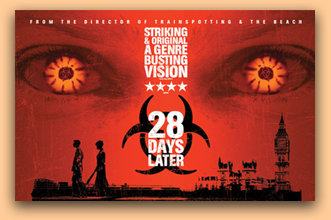
FEST2003
28 Days Later
Danny Boyle, director
Review by Rada Djurica
We all probably know this, but Danny Boyle is from England. He studied
literature and drama at university. His professional career started as
an assistant stage manager. He spent a long time working in the theatre.
Once he got a start in television, he kept on with film making. Danny
Boyle is one of the biggest and most interesting British directors today.
"Shallow Grave" (1994), starring Ewan McGregor and Kerry Fox,
signaled the magnificent start of the brilliant Boyle's filmmaking career.
Then in 1996, the legendary "Trainspotting" followed, again
starring Ewan McGregor. After that was "A Life Less Ordinary"
and then "The Beach" with Leonardo de Caprio, plus a couple
of films for television. His films are not considered big budget, but
they are big enough to be artistic and mainstream commercial at the same
time.
A group of animal rights activists force their way into a lab to release
caged animals. The chimps released from the cage are infected with a rage
virus. Freeing the infected animals, the activists get infected with the
virus, which spreads quickly to all people who come in contact with them.
The infection spreads so quickly that in only 28 days, London, along with
most of Great Britain, is infected with the virus. The virus causes people
to violently kill each other. Streets and buildings are full of corpses
and raving mad people. The infection is unstoppable and there are only
a few people left un-infected, and they're hiding.
After the 28 days of the virus spread, young and beautiful blue-eyed Jim awakens from a coma caused by a traffic accident before the tragic event. The hospital is empty, along with everything else. Streets and supermarkets are empty and all healthy people are well hidden. No one dares move. Jim is eating fast food from the street machines for free. The most impressive scenes are those when Jim wanders the deserted streets of London, calling out for help. It is very obvious the difference between healthy people and infected people. Infected people look like they are in "The Night of the Living Dead," raving mad, killing everything ahead. Animals, just like people, are not saved from the madness of self-destruction. Just one drop of blood, or a touch from the infected, causes immediate transmission of the infection.
As night falls, Jim is sheltering himself, still alone, in the church, to find dead bodies strewn in piles, murdered, with a few alive, searching desperately for new victims. People in desperation seek the help of God and the church, finding themselves quickly infected with the rage infection by others. There is no mercy any more. Only the infected and the healthy. There is no help. There is no God.
As he is chased back onto the street, Jim gets rescued by two survivors,
Selena and Mark. From them he gets a full explanation of what has happened
to England in the past 28 days. In the house of Jim's already dead parents,
Mark gets infected by the neighbors' rage virus, to be killed by Selena,
with no mercy. Together, they are moving out of the city, wisely avoiding
the dark corners and nightfall, traveling by day. Near Manchester, there
is an army base with healthy people left. But it turns out that even those
who are not infected, piled up in one place, with only two women survivors,
are becoming violent. The safe base is not a safe place any more. Running
away again is essential. A small group of people, the survivors, are being
chased by hordes filled with uncontrolled rage. The virus is rapidly developing
an unbearable urge to kill.
This is a stunning, chilling depiction of a country after a viral plaque,
and human behavior in situations like that. Boyle proved that he can make
a quite original and provoking horror film. And when it comes to horror,
there is nothing much left to explore. By all means, "28 Days Later"
is one convincing horror story.
Cillian Murphy as Jim is an absolute hero, a wanted survivor, a fighter for good, a good-looking victim of a big catastrophe, all elements essential for horror and catastrophe films. Cillian Murphy is a well-known British actor. Last year, festival audiences had the chance to see this actor in the film "Disco Pigs." He has mainly acted in the theatre in Dublin. This year Cillian was nominated for an Empire Award for the lead role in "28 Days Later." The film was nominated by Empire Magazine as the best in 2003. Danny Boyle said Cillian is perfect for the role because he has the acting abiltiies and physical qualities of Tom Cruise.
This is a real chiller thriller. And it demonstrates new potential, compared
to everything else done by Danny Boyle. The rest of the cast is quite
good, with decent, balanced performances. With Danny Boyle directing,
I wouldn't be surprised if it becomes a cult film.